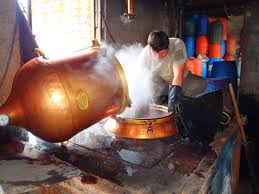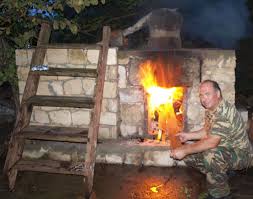 In today’s blog, I offer an excerpt from A Serpentine Path: Mysteries of the Goddess. The setting is Zaros, Crete, the time of year is mid-October.
In today’s blog, I offer an excerpt from A Serpentine Path: Mysteries of the Goddess. The setting is Zaros, Crete, the time of year is mid-October.
We had a scrumptious dinner of fresh fish, salad, fried potatoes, local amber-colored wine, and tiny olives. Later the two waiters, Themis and Nikos, bearing another pitcher of wine, sat down at our table.
They told us they were best friends and had just gotten out of the army. When they discovered that we were writers, the two young men were intrigued. “Our village has a very interesting history and many interesting customs,” they told us. “If you would like to come back and write about it, we will introduce you to all of the old people.” This conversation was in Greek, but I translated for Naomi. “This must indeed be a very interesting village,” I said to her, “because when they learn that I am a writer, most Greek men will say ‘write about me, I have a very interesting story.’ These men, in contrast, want us to write about their village.”
When we finished our wine, the young men offered to give us a lift back to our hotel on their motorbikes, suggesting we could have a coffee at the hotel bar. When we got to the hotel, they didn’t stop. “What happened?” I asked. “The bar wasn’t open at the hotel, so we’re looking for another place.” I wondered what Naomi, perched on the back of a motorbike and unable to speak Greek, must be thinking—especially since she was afraid of the unknown. We drove through the town and turned down a dirt road, arriving at the Zaros water factory. “We wanted to show you this,” they said sheepishly. “People drink our water all over Crete.” “O.K., “Naomi said, “but then you must take us back.” There were a few workers on the night shift, and the boys told us they had worked there too, before going into the army.
 Leaving the factory, we continued down the dirt road heading away from the town. “Where are we going?” I asked, wondering what we had gotten ourselves into. “Just a minute,” Themis said, as he got off the bike in front of what looked like a small house in the middle of nowhere. “We need to go back,” Naomi said definitively. “Yes, I already said that,” I answered. “Come inside,” Themis beckoned. “We want to show you how they make the raki (the colorless alcoholic drink that had been offered to us in shot glasses us after meals). This is the still,” he continued, as he showed us into a small dark room with a glowing fire. “After the wine is pressed, they put the skins and stems into barrels like those you see in the corner. The mixture takes six weeks to ferment, and then they bring it to a still, where it is heated over a fire. The steam that rises is directed through long curved pipes, and comes out as raki,” he said, pointing to various parts of the mechanism.
Leaving the factory, we continued down the dirt road heading away from the town. “Where are we going?” I asked, wondering what we had gotten ourselves into. “Just a minute,” Themis said, as he got off the bike in front of what looked like a small house in the middle of nowhere. “We need to go back,” Naomi said definitively. “Yes, I already said that,” I answered. “Come inside,” Themis beckoned. “We want to show you how they make the raki (the colorless alcoholic drink that had been offered to us in shot glasses us after meals). This is the still,” he continued, as he showed us into a small dark room with a glowing fire. “After the wine is pressed, they put the skins and stems into barrels like those you see in the corner. The mixture takes six weeks to ferment, and then they bring it to a still, where it is heated over a fire. The steam that rises is directed through long curved pipes, and comes out as raki,” he said, pointing to various parts of the mechanism.
 “I want to go home now,” Naomi said. “First you must taste the raki,” the boys insisted, guiding us through a narrow doorway into a second, somewhat larger room. A couple of men rose and offered us their Greek-style chairs. Raki was passed to us, followed by potatoes baked in the fire, seasoned with lemon and salt, to be eaten with the fingers, and passed on. “They say they are sorry, but they have eaten all the meat,” Nikos said apologetically. Naomi was about to insist again that she wanted to leave, but at that very moment, she was passed half of a juicy red pomegranate. She took a few seeds and ate them, passing the pomegranate on to me. “I guess this means we stay,” she said, “like Persephone.”
“I want to go home now,” Naomi said. “First you must taste the raki,” the boys insisted, guiding us through a narrow doorway into a second, somewhat larger room. A couple of men rose and offered us their Greek-style chairs. Raki was passed to us, followed by potatoes baked in the fire, seasoned with lemon and salt, to be eaten with the fingers, and passed on. “They say they are sorry, but they have eaten all the meat,” Nikos said apologetically. Naomi was about to insist again that she wanted to leave, but at that very moment, she was passed half of a juicy red pomegranate. She took a few seeds and ate them, passing the pomegranate on to me. “I guess this means we stay,” she said, “like Persephone.”
“Kostas is the best singer in Zaros,” Nikos said while pointing to a small wiry man with a moustache, who was singing plaintively while playing the Cretan lyre, a sort of violin played like a fiddle. The young boy with curly dark hair and round eyes played an instrument that looked like a guitar. “He is just learning,” one of the boys said. “Zaros has the best singers in the whole area. They play in all the villages.”
 We were told that the Cretan songs called mantinadas are based on rhyming couplets, which may be sung by one man, followed by another, and so on around the room, as the singers weigh up who is singing about the prettiest girl, and who has suffered the most for his love. The boys explained that whoever is distilling raki must throw a party for his friends and welcome anyone who turns up. Our party included many of the young men of the village, but on another night, in another still, the party might be for the older men. Women were not usually invited. Naomi and I were impressed by the warmth and affection the men expressed for each other. Many of them sat unself-consciously with their arms around each other, as our young men did from time to time, too. We felt privileged to be included in a men’s mystery. “Robert Bly, eat your heart out,” Naomi whispered to me. “This is the real thing.”
We were told that the Cretan songs called mantinadas are based on rhyming couplets, which may be sung by one man, followed by another, and so on around the room, as the singers weigh up who is singing about the prettiest girl, and who has suffered the most for his love. The boys explained that whoever is distilling raki must throw a party for his friends and welcome anyone who turns up. Our party included many of the young men of the village, but on another night, in another still, the party might be for the older men. Women were not usually invited. Naomi and I were impressed by the warmth and affection the men expressed for each other. Many of them sat unself-consciously with their arms around each other, as our young men did from time to time, too. We felt privileged to be included in a men’s mystery. “Robert Bly, eat your heart out,” Naomi whispered to me. “This is the real thing.”
Nikos and Themis whispered translations of the songs from the Cretan dialect into Greek, eager that we understand everything. While Naomi and I had expected songs of wild men out the mountains, violence, and vendettas, we were pleasantly surprised to learn that most of the songs were about unrequited love. “I have worn out many pairs of shoes climbing the mountains to get a glimpse of her,” sang one. “My goats’ udders are sore because I sit and think of my girl when I should be milking my flock,” replied another. Cups of raki, potatoes, and pomegranates continued to be passed around.
 “We don’t sing like this in America,” Naomi commented. “That’s too bad,” Nikos responded. “We sing out our joy and our pain. What do you do with yours?” What indeed, we wondered, as we sat in a dark room, entranced by unfamiliar rhythms, unexpected feelings. “This is not the underworld,” one of us said to the other, as we were pulled up to dance. “This is the Dionysian festival.”
“We don’t sing like this in America,” Naomi commented. “That’s too bad,” Nikos responded. “We sing out our joy and our pain. What do you do with yours?” What indeed, we wondered, as we sat in a dark room, entranced by unfamiliar rhythms, unexpected feelings. “This is not the underworld,” one of us said to the other, as we were pulled up to dance. “This is the Dionysian festival.”
 A Serpentine Path: Mysteries of the Goddess is available in Kindle and paperback. Carol P. Christ leads the life-transforming Goddess Pilgrimage to Crete. Carol’s other books include Goddess and God in the World (with Judith Plaskow) and She Who Changes and and Rebirth of the Goddess; also with Judith Plaskow, the widely-used anthologies Womanspirit Rising and Weaving the Visions.
A Serpentine Path: Mysteries of the Goddess is available in Kindle and paperback. Carol P. Christ leads the life-transforming Goddess Pilgrimage to Crete. Carol’s other books include Goddess and God in the World (with Judith Plaskow) and She Who Changes and and Rebirth of the Goddess; also with Judith Plaskow, the widely-used anthologies Womanspirit Rising and Weaving the Visions.
Updated December 26, 2016.


Your story gave me goosebumps …just beautiful xx
LikeLike
I was identifying with Naomi, annoyed, thinking I had been abducted, and then that sudden understanding of her situation, “like Persephone,” fabulous! But what does raki taste like?
LikeLike
Raki is like ouzo, only better. It is colourless until you add water, when it turns milky white. It has a slight anise flavour. Now I’m thirsty, but it is not available where I live.
LikeLike
I would say it has the slight taste of pepper, not sweet like ouzo.
LikeLike
Thank you, Carol. Good story. Sometimes when traveling one just needs to take a leap of faith and trust the people you are with. Glad you and Naomi were able to do that in this instance.
LikeLike
I was also a bit scared at first, but glad you remained calm and so got to see a part of life that few “outsiders” probably experienced. Makes me wonder how often fear keeps me from discovering beauty.
LikeLike
So glad your memoir will be in print again! Looking forward to more!
LikeLike
Love it that you made friends and found the pomegranate seeds and stayed like Persephone to hear the guys sing. It’s time for your book to reissued. Brava!
LikeLike
Sweet!
LikeLike
Loved the story Carol! It reminded me of our wonderful time in Zaros during the tour, as well as sipping raki in various places (which I loved). And of the warm hospitality, lively music and sweet men in Crete.
LikeLike
Some of my best travel memories are from unplanned encounters with strangers! What a wonderful story. I look forward to the book.
LikeLike
It’s as if these men could intuit that you both were seeking The Mystery, seeking Her.
LikeLike